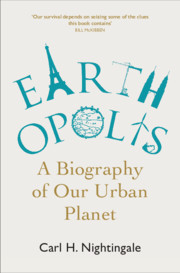Book contents
- Earthopolis
- Earthopolis
- Copyright page
- Dedication
- Contents
- Figures
- Maps
- Introduction Our Urban Planet in Space and Time
- Prologue Before and Beyond: Big Things in Tiny Places
- Part One Cities of the Rivers
- Part Two Cities of the World Ocean
- Part Three Cities of Hydrocarbon
- Chapter 10 Chimneys to Smokestacks
- Chapter 11 Planet of the People I: The Atlantic Cauldron
- Chapter 12 Planet of the People II: Feminists, Abolitionists, and los liberales
- Chapter 13 Weapons of World Conquest
- Chapter 14 Capitalist Explosions
- Chapter 15 The Pharaohs of Flow
- Chapter 16 Planet of the People III: An Urban Majority Takes Its Space
- Chapter 17 Lamps Out
- Chapter 18 The Labyrinths of Terror
- Chapter 19 Gathering Velocities I: Tailpipe Tracts and Tower Blocks
- Chapter 20 Gathering Velocities II: Liberation and “Development”
- Chapter 21 Greatest Accelerations I: New Empires, New Multitudes
- Chapter 22 Greatest Accelerations II: Shacks and Citadels
- Chapter 23 Greatest Accelerations III: Pleasure Palaces and Sweatshops
- Chapter 24 Great Accelerations IV: Maximal Hydrocarbon, Maximal Waste
- Chapter 25 2020 Hindsight … and Foresight?
- Acknowledgments
- Notes
- Index
Chapter 20 - Gathering Velocities II: Liberation and “Development”
from Part Three - Cities of Hydrocarbon
Published online by Cambridge University Press: 10 May 2022
- Earthopolis
- Earthopolis
- Copyright page
- Dedication
- Contents
- Figures
- Maps
- Introduction Our Urban Planet in Space and Time
- Prologue Before and Beyond: Big Things in Tiny Places
- Part One Cities of the Rivers
- Part Two Cities of the World Ocean
- Part Three Cities of Hydrocarbon
- Chapter 10 Chimneys to Smokestacks
- Chapter 11 Planet of the People I: The Atlantic Cauldron
- Chapter 12 Planet of the People II: Feminists, Abolitionists, and los liberales
- Chapter 13 Weapons of World Conquest
- Chapter 14 Capitalist Explosions
- Chapter 15 The Pharaohs of Flow
- Chapter 16 Planet of the People III: An Urban Majority Takes Its Space
- Chapter 17 Lamps Out
- Chapter 18 The Labyrinths of Terror
- Chapter 19 Gathering Velocities I: Tailpipe Tracts and Tower Blocks
- Chapter 20 Gathering Velocities II: Liberation and “Development”
- Chapter 21 Greatest Accelerations I: New Empires, New Multitudes
- Chapter 22 Greatest Accelerations II: Shacks and Citadels
- Chapter 23 Greatest Accelerations III: Pleasure Palaces and Sweatshops
- Chapter 24 Great Accelerations IV: Maximal Hydrocarbon, Maximal Waste
- Chapter 25 2020 Hindsight … and Foresight?
- Acknowledgments
- Notes
- Index
Summary
Chapter 20 of Earthopolis: A Biography of Our Urban Planet continues the book’s exploration of the early Cold War years and the threshold of the Urban Planet’s Greatest Acceleration. It visits imperial capitals like London and Paris as certain types of spaces there became “proto-Third worlds” where young nationalist leaders formed their early ideas of liberation and development, then brought them back to colonial cities to launch struggles for national independence. Mohandas Gandhi’s Satyagraha or non-violent resistance transformed the practice of mass urban protest even as Gandhi fought global urban industrialism, rising sectarian violence, and the British Raj en route to Indian independence. Mao Zedong took a contrasting route to power that also started with villages, in this case as effective military bases to expel far better-armed imperial and bourgeois nationalist forces and then seize China’s great cities. Dozens of other independence movements adopted mixtures of these two strategies, which coalesced above all around development – starting with state or capitalist investment in advanced industrial facilities as well as the housing, educational, health, transport, and planning infrastructure aimed to erase the sheer inequalities of the imperial-era Urban Planet.
- Type
- Chapter
- Information
- EarthopolisA Biography of Our Urban Planet, pp. 496 - 520Publisher: Cambridge University PressPrint publication year: 2022



